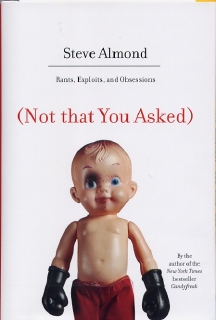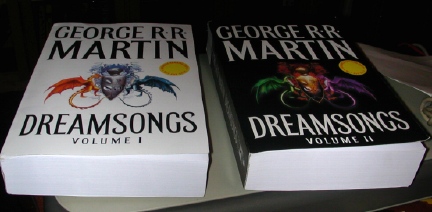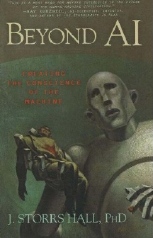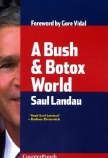|
|
|
|
This Just In...News
From The Agony Column
|
| |
|
09-14-07: A Review of 'A Concise Chinese-English Dictionary
for Lovers' by Xiaolu Guo ; Agony Column Podcast News : 'A Bush and Botox
World'
|
Translating
Emotion
Today I'm publishing
my written review of 'A Concise Chinese-English Dictionary for Lovers'
by Xiaolu Guo. It's a book that I think a lot of people
will enjoy. Here’s a link to the review. You can also hear an MP3
audio version that I published a couple of days ago; an interview
with the author can be found here
(full-length) and here
(short / phone). Basically, you have all the resources
you need on this website to decide whether or not this book is worth
your valuable time. It's such an easy read that it's hard to resist.
It won’t take much of your time, but it will reward your efforts.
Please note that books are always about translation; the reader is
expected to transform the words on the page into a reading experience,
a vision,
a life.
|
A Conversation With Saul Landau
|
|
|
Saul
Landau and his new book. |
Last night at Capitola
Book Café, I had the opportunity to sit down
and chat with Saul Landau, author of 'A Bush and Botox World'. I must admit,
I didn't know precisely what I was in for, but Landau went on a jeep ride
around Cuba with Fidel Castro in 1968. That makes for a pretty damn amazing
story. Here's
the MP3. Enjoy!
|
| |
|
09-13-07: '(Not That You Asked)', but Steve Almond is Kind
of a Smart-Ass ; Agony Column Podcast News: A Conversation with Ed Kaufman
of M for Mystery
|
Bad News for Oprah Fans
 |
|
| Takes
a lickin' and keeps on tickin'. |
Dear Steve Almond,
You know, I never read 'Candyfreak', though it sounded sort of interesting.
But when it came out in 2004, I was reading, let me check ... Tom
Perrotta ('Little Children'), Jasper
Fforde ('The
Well of Lost Plots'), Kem
Nunn ('Tijuana
Straits'), Graham
Joyce ('The
Limits of Enchantment'), you know – real books, not media manufactured hype-o-matic crap like 'Candyfreak'.
Did I write that, about a book extensively covered on NPR? I am just so sorry.
It's tragic, what flows forth from my fingertips at oh-dark hundred in the
morning. I get out there on little strip of pavement by the beach and run,
get the endorphins flowing (and you know that shit's real, it's not just
some myth), and then come back and who knows what the fuck I'm going to say?
And it's not like I can ever, ever change this stuff. Once it goes up on
the web, it is gods-damned graven in stone.
I'm writing now to talk about your latest exercise in non-stop smart assery
'(Not That You Asked)' (Random House ; September 11, 2007 ; $21.95). The
first thing I have to ask you is how hard you had to fight to get your title
in the parentheses. That sort of thing just screams for editorial intervention.
It's like submitting a story to a magazine typed on graph paper, something
for which George Scithers seriously reprimanded me jeez, was it thirty years
ago now? Maybe more. The point being that, well, it seems kind of self-indulgent.
Then again, I suppose that's not surprising because this book is, not to
put too fine a point upon it, more than a little self-indulgent. It is a
non-stop rant-o-matic spew-fest. (I'm really unleashing my inner hypehator
with this article, I'll tell you.) If I were an editor and someone writing
for me turned in an article like this, I'd tell them to shitcan it and start
again, with something more demure and restrained. Not that you'd know anything
about restrained.
After all, your book starts out with an extended series of letters to Oprah.
First you trash her, her show and refuse to be in her book club, then you
try to cuddle up.
All I know is I read them and laughed enough to keep me reading into the
next bit, about Kurt Vonnegut. Let me mention that I'm a big fan of footnotes
and you sir, sling them with a fair amount of skill. It almost balances out
the fact that you write about sports.
Almost.
The reason I'm writing is because I have this brilliant plan to publicize
this collection. As I read the essays, I noticed that many of them were rather
short-ish and a fine length for reading while on the commode. It seemed to
me that a great way to publicize this book would be to have the publisher
run off a few hundred water-proof, chainable-to-the-stall copies and install
(get it?) them in the johns at say, Grand Central Station, or Fenway Park,
or something. Everyone who makes use of the facilities would only have time
to read one essay, and if they liked it, why, they'd be on their way to the
bookstore in a jiffy. Think of the traffic and the captive audience you've
got! Or maybe you could run off a sheet with say, eight pages side-by-side
about the size of a newspaper unfolded and install them over the newspapers
that one often finds in restroom of finer restaurants and bars. That might
be cheaper, but I think the stall idea is better because it's more outrageous.
You could probably get pretty extensive media coverage of that event alone.
Nobody would even have to give a, well, whatever about the book – the
prank alone will sell whatever is at the end that chain. Maybe you could
include a coupon or something as well as the book. Or work with WalMart,
assuming they're selling the book. Think of the traffic in the restrooms
at WalMart! The mind boggles.
So that's my idea for promoting this book. Now you know the jacket-flap copy
has something about Ham for Chanukah, and I think it's supposed to be funny,
but I'm not up on the Chanukah traditions. When this thing goes into a second
printing you may want to have your folks take a second look at that. So:
check that flap, jack, and think about the commode-ification of American
arts and letters vis a vis your new book. I hope that this helps you.
Not that you asked.
Sincerely,
Rick Kleffel
|
Agony Column Podcast News: A Conversation with Ed Kaufman
of M for Mystery
Today I talk with Ed Kaufman, owner of M for Mystery Books. He's well
known for his expertise in the genre and beyond; his bookstore is a
highly-regarded
tour stop for major authors. You
can hear the MP3 from this link, or
just mail-order your podcast subscription through iTunes.
|
| |
|
09-12-07: Richard Parks Is 'Worshipping Small Gods' ; Agony
Column Podcast News : An Audio Book Review of Xiaolu Guo's 'A Concise Chinese-English
Dictionary for Lovers
|
Fourteen Fables
|
|
An
unassuming cover for a deep book.
|
We regard ourselves in the mirror and behold that we are as gods.
Petty. Vain. Violent. Cruel. Insecure. Eternal.
There is but one place to start your education as a god. 'Bullfinch's Mythology'.
There you'll find all the monsters, the humor, the humans you can stand,
elegantly set against one another and left to play out demonstrations of
how logic and laws, love and loss work in our world.
The Greek myths have sent many a young man and woman down the path that
leads to the twin evils of reading speculative and classical fiction. There's
a simplicity and a directness in these tales that lends them a truly eternal
appeal. And this classic, eternal feel gives on the idea that : That's
all there is. No such new stories could be written. These fables are almost
the literary equivalent of the basic rules of math, the axioms that power
the heart of all writing.
But don’t think that mathematicians have given up the search for
new axioms; and don't think that, "They don’t write 'em like
that any more." In fact, Richard Parks writes them exactly like that
in 'Worshipping Small Gods' (Prime Books ; May 1, 2007 ; $14.95). Parks'
collection offers the pleasures of 'Bullfinch's Mythology' with a much
wider cultural reach. Spanning oriental, Greek and other traditions, Parks
tells tales of deceptive simplicity with complex reverberations. They're
addictively readable and strangely unforgettable.
'Kallisti', which starts the collection is indeed a Greek myth; not one
that we've heard before, but Parks writes with the sort of veracity that
it seems we must have heard it before. He effortlessly combines a slightly
wry modern vernacular language with the sort of eternal distance that makes
a myth a myth and not simply a story about gods. 'Yamabushi' has the flavor
of an oriental fable, but this story of a supernatural being bedeviled
by a guileless human is happily reminiscent of Clive Barker's 'The Yattering
and Jack'. 'Voices in an Empty Room' is something of an exception, until
you realize that this excellently executed ghost story is simply a fable
from the raw maw of modern America. We're allowed our myths. They’re
not just for the ancients, you know.
And so it goes. Myth to fable to tall tale to humorous jape. Parks has
a swell sense of comic timing in his language; check out the opening paragraph
of 'The Right God'. Every phrase swings in line and every line feeds a
wicked sensibility. Parks is not averse to turning out a fable set in the
future even though most of the stories here are transpire on the eternal
plane.
As a book, 'Worshipping Small Gods' is pretty bare bones. Fourteen stories,
three original to the collection, one of those, 'Diva', close to novella
length. There is no introduction, and there are no comments about the stories,
which is pretty much in keeping with the mythic nature of the whole enterprise.
This is all about those words, written and published, that create a picture
in the readers' minds. Eternal. Human. Small.
|
Agony Column Podcast News :
An Audio Book Review of Xiaolu Guo's 'A Concise Chinese-English Dictionary
for Lovers
Today I'm podcasting
an advance review of Xiaolu Guo's 'A Concise Chinese-English Dictionary
for Lovers'. You
can hear the MP3 from this link; or you can
read the review tomorrow. Or both – thought the audio review will
include material not found in the writer review. Just make your life easy
and subscribe to the podcast via iTunes. It's free and I hope to keep it
that way; but I'll need your help.
|
| |
|
09-11-07: George R. R. Martin's 'Dreamsongs' ; Agony Column
Podcast News : A Conversation With Paul Saffo at the Singularity Summit
|
No, You're Not Dreaming

|
This
is not a dream.
|
Those two huge honkin'
book bricks by George R. R. Martin are indeed coming
your way. 'Dreamsongs, Volume I' (Bantam Spectra / Random House ; November
6, 2007 ; $27)
and
'Dreamsongs, Volume II' (Bantam Spectra / Random House ; December
4, 2007 ; $27) will offer a rather different*[thanks, JS)
the same view of this prolific writer
from as that presented in his quickly sold-out 'GRRM' retrospective
published by Subterranean Press only
three short years ago. While these will undoubtedly
have a much larger print run, still – it might pay to be first
in line. If only for the fact that you might stand a chance of finishing
them before you shuffle from this mortal coil.
'Dreamsongs, Volume I' is, after all, 683 pages spanning only the early
parts of Martin's prolific career. You'll get a lot of what you might expect
in such a collection. Early Bram Stoker, Hugo and Nebula Award-winning
stories, fan writing and even the novella 'The Ice Dragon'. You'll find
one of the first stories I remember reading, 'The Way of Cross and Dragon',
plus a lot of stories from a weird old paperback collection I used to have,
a UK deal with one of the ugliest, most off-putting covers ever. These
include 'Sandkings', passably adapted by the new incarnation of The
Outer Limits and 'Nightflyers', whose adaptation is arguably one of the worst
hatchet jobs ever performed on a beloved science fiction story. And I believe,
the beginning of the acting career of Power Station lead singer Michael
Des Barres. Oh, the humanity.
Clocking in at 738 pages, 'Dreamsongs, Volume II' goes after the later
work of Martin. It fires off a couple of 'Tuf' stories, then two scripts
for Hollowood; a script for an episode of the re-up of The Twilight
Zone,
and his script for Doorways, a pilot that was apparently filmed but never
aired. Then of course, you get to my mind more substantial fare, like 'The
Skin Trade', from 'Night Visions 5' and the Song of Ice and Fire prequel,
'The Hedge Knight' from 'Legends'. All this gets followed by a thorough
fiction checklist for those even fussier than I.
So far, so good; pretty much what you’d expect from two book-bricks
of NY-publisher retrospective. Yes, it does lack the focused, obsessive
thoroughness of the 'GRRM' collection, which is why you should always be
on top of what the small press is doing, but it does offer some goodies
not found there are well. And it includes two more items worthy of great
note. Each volume is divided into sections (1-5 in Volume I, 6-9 in Volume
2), and each section is preceded by a generous essay from Martin. For most
readers these form the heart of the story told across the two books, the
through-line that makes this a continuous read, even if you don’t
read them each cover-to-cover in sequence. The two-volume retrospective
itself has a story – the author's story. Not surprisingly, it's a
story nearly as fantastic as those it bookends. Plus, it's pretty funny,
as these pieces often are.
You can add to that some illustrations by Michael Kaluta. They're not in
the ARCS so I really can't comment on them, but my guess is they’re
pretty sparse. Still, better than none. What are you doing for the holiday
season? Here's an idea. Start at page 1. Proceed to page 687; start again
at page 1. Proceed to page 740. If you read at the right pace, by the time
you finish, you'll be able to tuck into the next volume in Song
of Ice and Fire.
|
 |
|
| Paul
Saffo. Smiling. |
Agony Column Podcast
News : A Conversation With Paul Saffo at the Singularity Summit: "If
you want to see what thirty-somethings are going to be developing at
companies when they are senior managers, find out what they read when
they were fifteen."
Here's a brief conversation
with Paul Saffo. There's a reason this man is the first name to people's
mouths when it comes to futurism, as you'll see when you hear him on
the MP3, or via your iTunes subscription to The Agony
Column
podcast.
|
| |
|
09-10-07: From the Singularity Summit 2007: Dr. J. Storrs Hall
|
IA and AI
|
|
|
Book
and author. Neither robotic. |
Fresh
from the Singularity Summit
of 2007, I have an interview with Dr.
J. Storrs Hall, author of 'Beyond AI: Creating the Conscience
of the Machine'. I'll admit to being rather frazzled after two days of
immersion
in AI,
so I'm going to keep this article short and to the point. Hall was a
fascinating speaker at this fine event, one of many who talked about
the influence of science fiction's visions on the development of AI in
the real world. The IA in the title above refers to none other than Isaac
Asimov, whose "Three Laws of Robotics" played a significant role in Hall's
speech. But what's unexpectedly interesting here is Hall's dissection
of ethics itself, a look at our laws that is unusually clear-headed and
very entertaining. Not that this was recorded at a live event, so you'll
get than ambience and I trust enjoy it. There was a lot of erm, electricity
in the air; not surprising when you hear the speeches of the participants.
Here’s my MP3 of my
conversation with Hall; here’s a link to the RealAudio,
just to ensure that my webstats are thoroughly diluted.Or go to iTUnes
to subscribe to the podcast. No matter what you use to listen, do listen.
Learnit's
the law. Or should be!
|
| |
|
|








